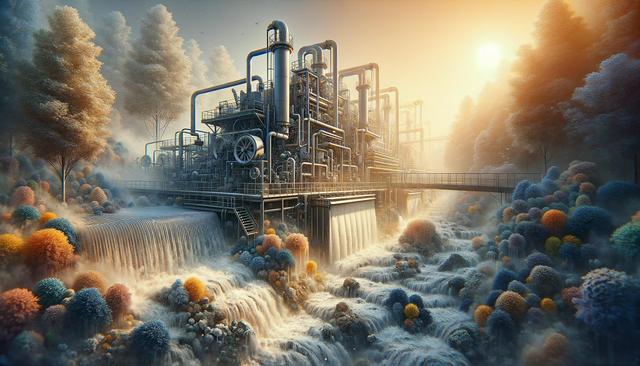
Advanced Sludge Dewatering Using Filter Press Systems
Understanding the Role of Filter Press Systems in Sludge Dewatering
Filter press systems have become a fundamental component in modern waste management strategies, particularly within industries that generate large volumes of sludge. These systems operate by applying high pressure to sludge material, forcing the liquid component through specialized filter cloths while retaining the solid fraction. The result is a significant reduction in sludge volume, which directly contributes to lower transportation and disposal costs. This process not only minimizes the environmental footprint of industrial operations but also aligns with stricter regulations on waste management and sustainability goals. Filter press systems are used in various sectors, including food processing, pharmaceuticals, mining, and wastewater treatment facilities, where sludge characteristics can vary widely and require adaptable solutions.
Key Advantages of Advanced Sludge Dewatering with Filter Presses
One of the primary benefits of using filter press systems for sludge dewatering is their ability to produce a high solids-content cake, which is easier and more cost-effective to handle. This efficiency stems from several design features and operating principles that make filter presses particularly suitable for demanding applications. Among the notable advantages are:
- High dewatering performance across different sludge types
- Reduced volume of waste for transport and disposal
- Lower chemical usage compared to other dewatering technologies
- Customizable operation to match specific process requirements
Moreover, advanced filter press systems often include automation features that enhance operational efficiency and safety. These may involve automated plate shifting, cake discharge, and cloth washing, reducing the need for manual intervention and improving consistency in performance.
Technological Innovations Enhancing Filter Press Efficiency
Recent developments in filter press technology have significantly improved the effectiveness of sludge dewatering. Innovations such as membrane plates allow for additional squeezing of the sludge cake after initial filtration, resulting in even higher dryness levels. These membrane systems can be particularly valuable in industries dealing with high-moisture or viscous sludge. Another enhancement is the incorporation of smart controls and monitoring systems, which enable real-time data analysis and remote operation. This level of automation supports predictive maintenance, reduces downtime, and ensures optimal dewatering performance. In addition, energy-efficient motors and pumps are now commonly integrated into newer systems, contributing to lower operational costs and environmental impact.
Operational Considerations for Maximizing Filter Press Performance
To ensure optimal performance from a filter press system, several operational factors must be carefully managed. The selection of the appropriate filter cloth is critical, as it directly affects filtration rate and cake quality. Operators must also monitor feed pressure, cycle time, and cake release to maintain efficiency. Routine maintenance, such as cleaning and inspection of plates and cloths, helps prevent issues like clogging or leakage. Training for personnel is another important aspect, as well-informed operators can identify and address potential problems early. Key operational tips include:
- Regular inspection of hydraulic systems and seals
- Monitoring sludge characteristics and adjusting parameters accordingly
- Ensuring proper alignment and tensioning of filter cloths
- Documenting performance metrics for continuous improvement
Implementing standard operating procedures and scheduled maintenance can significantly extend the life of the equipment and enhance reliability.
Environmental and Economic Impacts of Sludge Dewatering
Implementing filter press systems for sludge dewatering offers substantial benefits not only from an operational standpoint but also in terms of environmental responsibility and cost efficiency. By significantly reducing the volume and weight of sludge, industries can decrease the number of disposal trips, which in turn lowers fuel consumption and greenhouse gas emissions. Additionally, in some cases, the dewatered sludge cake can be repurposed or recycled, further minimizing waste. Financially, reduced disposal costs and improved resource use translate into tangible savings over time. Organizations that prioritize environmental stewardship can also benefit from enhanced reputation and compliance with environmental regulations.
From a broader perspective, filter press systems contribute to circular economy principles by enabling resource recovery and minimizing the burden on landfills. As industries continue to seek sustainable solutions, the integration of advanced sludge dewatering systems becomes a logical step toward achieving long-term environmental and economic goals.
Conclusion: Supporting Industrial Sustainability Through Filter Press Technology
Advanced sludge dewatering using filter press systems provides a practical and efficient way for industries to manage waste, improve sustainability, and reduce operational costs. By adopting these systems, facilities can handle a wide range of sludge types effectively while benefiting from technological innovations that enhance performance and reliability. With proper maintenance and operation, filter press systems offer a durable and adaptable solution that aligns with both regulatory requirements and environmental goals. As environmental standards become more stringent, investing in filter press technology represents a strategic move for organizations committed to responsible and efficient waste management.


